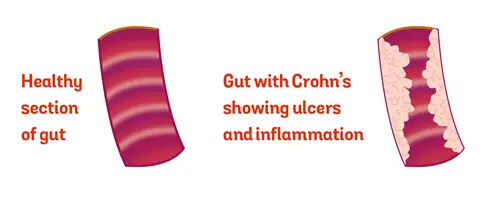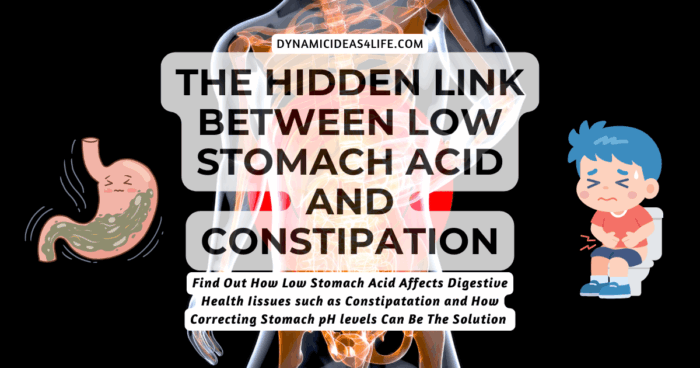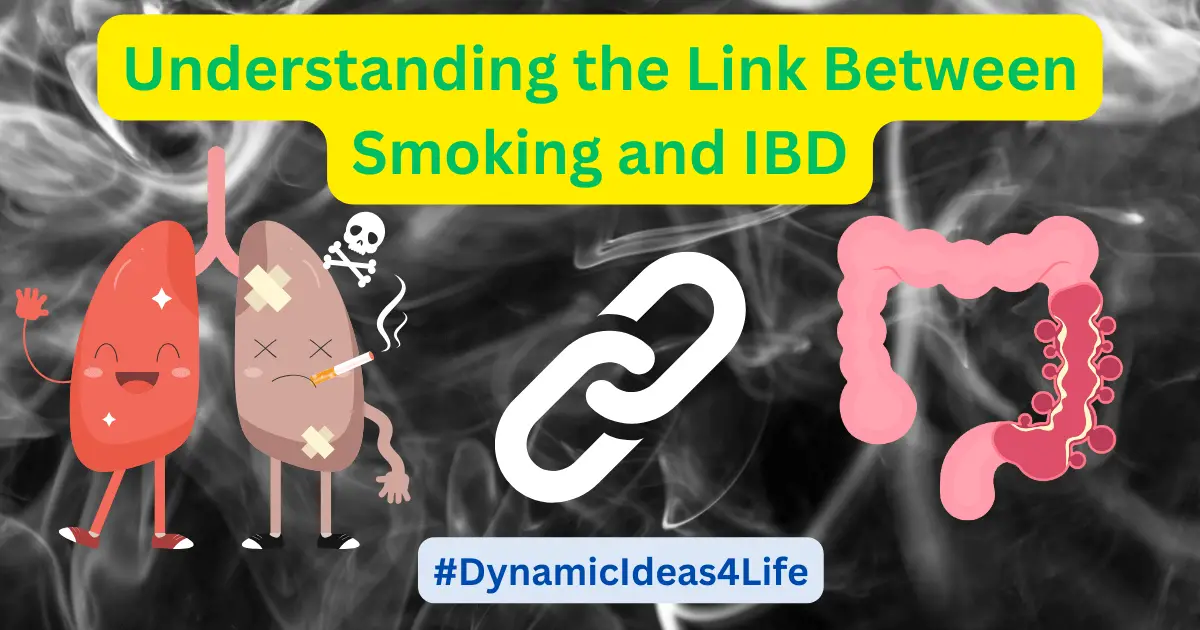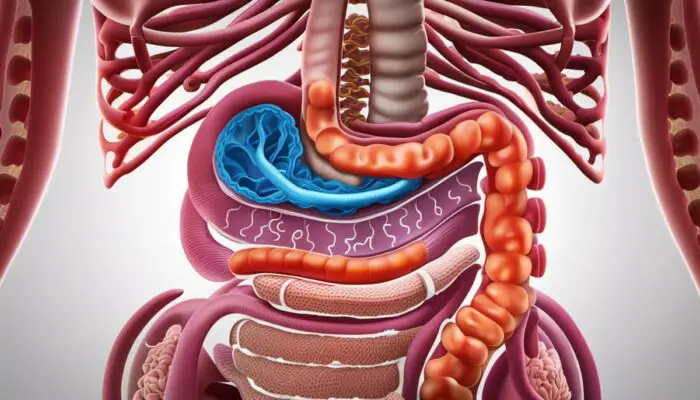In the contemporary world, there is a growing awareness and concern surrounding health and wellness, feeding the ceaseless exploration of factors that influence our well-being, sometimes in bewildering ways. One such issue is the multifaceted connection between Smoking and IBD (Inflammatory Bowel Disease), a topic fraught with myriad complexities.
This discussion delves into comprehensive details about IBD, including its types such as Crohn’s disease and Ulcerative colitis, their distinguishing features, symptoms, and credible speculations about their causation. Then, it casts light on the ubiquitous menace of smoking, exploring its prevalence, the composition of cigarettes through a scientific lens, and its far-reaching impacts on health.
By weaving together these strands, an exploration into how smoking interacts with IBD is unfolded, citing the latest scientific studies and real-life case studies to corroborate the narrative.
Understanding the Link Between Smoking and IBD
Can Smoking Cause Inflammatory Bowel Disease? This may be a concern to many smokers who experience digestive discomfort. Some studies suggest that smoking can be an environmental risk factor for Crohn’s Disease but this is not conclusive.
Although, with this in mind it is still important to consider the effects of smoking on overall health even if this is eventually discovered not to be the true cause of an individuals IBD.
Either way let’s examine this further to see what really is the basis here…
Understanding IBD
Inflammatory bowel disease or IBD is an umbrella term used for chronic inflammatory conditions that affect the digestive tract, including the small and large intestines.
The two main types of IBD are Crohn’s disease and Ulcerative colitis.
While they belong to the same disease spectrum, their impact on the digestive system varies.
Crohn’s disease can affect any part of your digestive system, from the mouth to the anus. However, it most commonly affects the lower small intestine (ileum) and the colon. It inflames multiple spots in the digestive tract, and the inflammation can reach multiple layers of the bowel’s wall.

On the other hand, ulcerative colitis specifically impacts the colon, resulting in persistent inflammation and ulcers or sores in the lining of the large intestine. Unlike Crohn’s disease, the inflammation usually occurs in continuous stretches of the colon.
Common Symptoms of IBD
The symptoms of IBD can vary widely and differ based on the type and severity of the inflammation. Common signs can include persistent diarrhea or constipation, abdominal pain, cramping, blood in the stool, reduced appetite, and unplanned weight loss.
Severe cases can lead to complications such as intestinal blockages, fistulas (abnormal connections between the intestines and other parts of the body), abscesses, malnutrition, and an increased risk of bowel cancer.
The Potential Causes of IBD
The exact cause of IBD remains unclear, but a combination of factors appears to play a role in its development. Genetics could be a significant contributing factor as IBD often runs in families. Imbalances in the gut microbiome, the community of microorganisms that live in the digestive tract, may also contribute to IBD.
It is widely believed that an overactive immune system response to normal gut bacteria may cause the inflammation seen in IBD. External factors like diet and stress, while not directly causing the disease, can exacerbate these conditions.
Smoking and IBD
The relationship between Smoking and Inflammatory Bowel Disease (IBD) is quite complex and varies significantly depending on the type of IBD. There’s a wealth of research that suggests smoking can have diametrically opposed effects on Crohn’s disease and Ulcerative Colitis.
It is generally agreed upon in medical circles that smoking represents a risk factor in the development of Crohn’s disease. Various scientific studies indicate that individuals who smoke are more likely to develop Crohn’s disease than those who don’t.
Moreover, they often tend to experience a more intense trajectory of the disease with an increased likelihood of relapses, surgical requirements, and dependency on medication.
Interestingly, smokers seem to have a reduced risk of developing Ulcerative Colitis as compared to non-smokers, and some people with this disease have reported improvements in their symptoms when they smoke.
However, it cannot be overemphasized enough that, although smoking appears to alleviate Ulcerative Colitis symptoms in some instances, the extensive health risks concurrently linked to smoking unequivocally outweigh any potential benefits it might offer in managing IBD symptoms.
Smoking: An Overview and Its General Health Impacts
Understanding Smoking
Smoking is the act of burning a substance, predominantly tobacco, and inhaling the resulting smoke to channel its taste or allow its absorption into the bloodstream. This primarily occurs via cigarettes, which contain an astounding array of approximately 600 ingredients.
These ingredients, upon burning, generate over 7000 chemicals, 69 of which are known carcinogens (substances with the capability to cause cancer). These astonishing figures notwithstanding, smoking remains widespread.
Nicotine, a core constituent of cigarettes, is notoriously addictive. Consequently, this addiction often leads to persistent smoking, with individuals attempting to quit frequently exhibiting withdrawal symptoms such as mood fluctuations, intense cravings, and concentration difficulties.
On a socio-economic level, the consequences of smoking extend significantly, contributing to numerous social and economic problems encompassing personal financial instability, escalating healthcare costs, and environmental degradation.
Passive Smoking
Even those who do not partake in the act of smoking are not immune to its harmful effects through exposure to passive, or secondhand, smoking. Passive smoking occurs when non-smokers inhale the smoke exhaled by smokers or from burning cigarettes. This exposure can significantly increase the risk of many of the same diseases experienced by active smokers, including lung cancer and heart disease.
Health Effects of Smoking
Smoking cigarettes is detrimental to almost every organ and system in the body, leading to a host of health problems. It is the leading cause of preventable deaths, particularly attributed to lung diseases and cancer. It greatly increases the risk of coronary heart disease, stroke, lung cancer, and other cancers. Other health complications such as osteoporosis, cataracts, and skin aging are also closely linked with smoking.
Despite the devastating health consequences, nicotine dependency makes quitting this habit tremendously challenging, often requiring a multifaceted approach that includes medical, psychological, and behavioral interventions.
Smoking and IBD
Inflammatory Bowel Disease (IBD) comprises conditions that cause inflammation in the digestive tract, including ulcerative colitis and Crohn’s disease. The relationship between smoking and IBD is complex and multifaceted, with studies indicating that smoking may have differing effects on these two conditions.
Smoking appears to have a protective effect against ulcerative colitis, potentially reducing the severity of the disease in those who smoke. However, it is essential to underscore that this does not equate to health benefits, as the harmful effects of smoking far outweigh any possible protective impact.
Conversely, smoking has repeatedly been linked to an increased risk and severity of Crohn’s disease. It may lead to more flares, increased medication requirements, and a greater likelihood of needing surgery.
The exact mechanisms by which smoking aggravates Crohn’s disease remain unclear, but it may relate to its impacts on the immune system and intestinal permeability.
Even though the comprehensive biological elements that form a connection between smoking and IBD – Inflammatory Bowel Disease – are continuing to be explored, it has been clearly highlighted through research that smoking cessation is paramount in the management of IBD.
A comprehensive approach to handling smoking addiction among IBD patients can include medical intervention, behavioral therapies, the strengthened support of social circles, and informative, educational support for patients.

Exploring the Connection Between Smoking and IBD
The Connection Between Smoking and Inflammatory Bowel Disease
There is abundant scientific research that suggests a significant correlation between smoking and Inflammatory Bowel Disease (IBD). IBD is recognized by persistent inflammation within the digestive tract. The two main types of IBD, namely Crohn’s disease and Ulcerative Colitis, seem to have inversely related relationships with smoking. It has been noted that the probability of development of Crohn’s disease increases in smokers, whereas, instances of Ulcerative Colitis appear to decrease with smoking.
Why is smoking considered a risk factor for Crohn’s disease?
There are multiple reasons to consider. Smoking has the ability to compromise the mucosal lining within our intestines, further leading to a condition known as ‘leaky gut syndrome‘, which is a fundamental trait of IBD.
In addition, smoking can lead to compromised immune responses, impaired blood flow, create imbalances in gut flora, and lead to gut mobility issues.
All of these factors may contribute to the increased risk of Crohn’s disease in smokers.
Interestingly, smoking seems to act as a deterrent to the development of Ulcerative Colitis. Why? Nicotine, present in cigarette smoke, is said to have anti-inflammatory properties which might be a contributing factor in the decreased incidence of this form of IBD.
However, the exact mechanisms of this effect are still under study, and despite this unusual finding, the harmful health effects of smoking clearly indicate that utilizing it as a remedy for IBD would be highly inadvisable.
The Impact of Nicotine and Other Chemicals
Furthering our understanding of the complex relationship between smoking and IBD requires a closer look at nicotine and other toxic substances found in cigarettes. Nicotine, as aforementioned, exhibits anti-inflammatory properties which might protect against Ulcerative Colitis.
Still, its vasoconstrictive ability could exacerbate Crohn’s disease by reducing blood flow in the intestines and precipitating inflammation.
Other toxins in cigarettes, including carbon monoxide and tar, might play a role in increasing IBD risk or severity. These components can induce oxidative stress and enhance inflammatory responses in the body, potentially triggering or exacerbating intestinal inflammation.
Smoking Impact on IBD Treatment
Regarding treatment, smoking can deter the effectiveness of medication prescribed for IBD. For instance, studies have shown smokers with Crohn’s disease often need higher doses of corticosteroids and are more likely to undergo surgery compared to non-smokers.
There’s also evidence that suggests smoking may reduce the efficacy of biologic drugs – a primary treatment for IBD. Needless to say, these observations underline the importance of quitting smoking for all patients with IBD, but especially for those with Crohn’s disease or anyone who is about to start treatment.
To Summarize
While more research is needed to completely comprehend how smoking impacts IBD’s development, severity, and treatment reaction, significant evidence already exists showing its detrimental influence on Crohn’s disease. The effect of smoking on Ulcerative Colitis, however, remains somewhat unclear. As such, it is imperative that individuals who are either at risk of or have been diagnosed with IBD quit smoking.

Case Studies: Real-Life Impacts of Smoking on People with IBD
Understanding Through a Case Study: Meet Julia, an IBD Sufferer
Diagnosed with Inflammatory Bowel Disease (IBD) when she was 25, Julia remains a vivid example of how smoking can worsen this condition. Initially, Julia was able to manage her IBD symptoms relatively effectively through medical treatment and dietary alterations. Yet, her heavy smoking habit, formed in her late teens, complicated her health picture.
Over time, her health deteriorated leading to more frequent and severe IBD flare-ups. Ignoring doctors’ persistent advice to quit smoking, Julia paid a hefty price.
Julia’s continued smoking led to a substantial decline in her health, and she eventually had to undergo surgery to remove parts of her inflamed and scarred bowel, a harsh outcome of the combined impacts of IBD and smoking.
Case Study 2: Carl, a Smoker Who Developed IBD
Carl had been a pack-a-day smoker from the age of 18, even though he had no other significant health issues. However, when he turned 40, he began experiencing severe abdominal pain and irregular bowel movements, with occasional blood in his stool.
After a series of tests, Carl was diagnosed with IBD. His gastroenterologist informed him that his smoking habit had significantly contributed to the development of the disease. The doctor explained that smoking had altered his gut microbiome, leading to increased inflammation and an overly reactive immune system, the hallmarks of IBD.
Carl was shocked at the damage his decades of smoking had caused on his intestines and immediately made efforts to quit.
Case Study 3: Hannah, a Patient Living with IBD and Passive Smoking
Hannah lived with IBD for many years and took great care in managing her condition with regular exercise, a nutritious diet, and medication. Unfortunately, her partner was a smoker, and although they smoked outside, Hannah was still regularly exposed to passive smoke.
Her symptoms worsened over time, with more frequent and severe flare-ups disrupting her daily life. Upon raising this with her healthcare provider, it was suggested that passive smoking could be contributing to her deteriorating condition. Hannah and her partner took immediate action. Her partner transitioned to smoke-free alternatives, which made a noticeable improvement in Hannah’s IBD symptoms.
Case Study 4: Thomas, an IBD Patient with Reduced Symptoms
At age 30, Thomas was diagnosed with IBD. He was also a regular smoker and became aware of the connection between IBD and smoking from his healthcare provider. Under the guidance of his doctor, he took up a smoking cessation program.
Although it was challenging, Thomas managed to quit smoking after five months.
Thomas noticed a significant improvement in managing his IBD symptoms after quitting smoking. His flare-ups became less frequent and less severe, leading to an overall improved quality of life. His experience underscored the dramatic impact that giving up smoking can have on managing and controlling IBD.
These pinpointed case studies underline the profound impact that smoking can have on the emergence and progression of Inflammatory Bowel Disease (IBD). The detrimental effects of direct as well as passive smoking are underscored in these scenarios, emphasizing their significance in the multifaceted care required by individuals suffering from IBD.

Advice for Smokers with IBD and How to Quit
Delineating the Influence of Smoking on Inflammatory Bowel Disease
Inflammatory Bowel Disease (IBD) encompasses a cluster of long-term disorders causing inflammation within the digestive tract. The primary variants of IBD are recognized as Crohn’s disease and Ulcerative Colitis. Research indicates a concerning correlation between smoking and adverse impacts on IBD, potentially intensifying the symptoms and complicating the condition.
The Benefits of Stopping Smoking for People with IBD
Quitting smoking offers numerous health benefits for all individuals. However, for individuals with IBD, particularly Crohn’s disease, quitting smoking is often associated with reduced severity of their symptoms and a lower risk of needing surgery.
Evidence shows that stopping smoking can improve the outcomes of Crohn’s Disease by not only decreasing the need for steroids and immunosuppressants but also by reducing hospitalizations and surgeries. Furthermore, the general health benefits of quitting smoking, such as improved heart and lung health and a lower risk of various types of cancers, will also benefit individuals with IBD.
How to Quit: Smoking Cessation Programmes and Other Resources
For those who wish to quit smoking, the journey can be daunting, but there are numerous resources available. In the United Kingdom, there exist several smoking cessation programs, with aid available from public health services, pharmacies, and local community groups. The NHS offers stop-smoking services, which have been shown to be effective and supportive to help people quit for good.
Tools such as nicotine replacement therapy (NRT) and prescription medications can also aid the process. Psychological support or counseling is also beneficial. This combined approach – medication plus behavioral support – is the most effective way to stop smoking and achieve long-term abstinence.
Handling Withdrawal Symptoms and The Role of Social Support Network
Giving up nicotine leads to withdrawal symptoms that can make it challenging to quit. These symptoms may include irritability, restlessness, decreased heart rate, increased appetite, cravings, and other physical and emotional symptoms. It’s essential to anticipate and manage these symptoms effectively by trying strategies like exercise, mindfulness, and using prescribed medicinal aids.
Having a robust social support network, including family and friends, plays a vital role in successfully quitting smoking. They can encourage and support the individual in their journey to quit, offer distractions during withdrawals, and help maintain motivation when it’s tough to continue.
The Role of Healthcare Providers in Smoking Cessation
Due to the complex interplay between IBD and smoking, discussions with healthcare providers should form an integral part of the smoking cessation process. It would allow for individualized advice, taking into account not only the unique challenges faced by those with IBD but also the most suitable quit-smoking strategies.

In Conclusion
While battling an illness like IBD can be a winding journey that is fraught with obstacles, it is crucial to remember the monumental influence lifestyle choices exert in mitigating the symptoms and enhancing one’s quality of life. When it comes to smoking, it is evident that its adverse impacts are not constrained to general health concerns but can prove particularly detrimental to IBD patients.
Whether it exacerbates the symptoms or interferes with treatment effectiveness, the hazardous interplay between smoking and IBD cannot be overstated. However, deciding to quit smoking is within one’s power and the path to cessation, though arduous, is not an impossible one.
Whether it is self-determination, the support of loved ones, or professional help through smoking cessation programs, there are numerous resources to assist in this mission.
Ultimately, conquering this harmful habit is not just a victory over nicotine dependence but a defiant stand in favor of overall health, particularly, in assuaging IBD.






Ab Workouts Anxiety and Depression best ways to lower blood sugar BiOptimizers blood pressure supplements blood sugar support supplements Digestive Enzymes Supplement digital products Dr Sam Robbins Exercise Gut Health Healthy Living heart health HFL how to lower blood sugar levels How To Lower Cholesterol insulin resistance joint health supplement Keto keto dieting Keto Diet Weight Loss leaky gut supplements leptin resistance list Magnesium deficiency Matt Gallant mental health multivitamins Nootropics nutrient supplements Oral Healthcare Probiotics Probiotic Supplements proteolytic enzymes reverse type 2 diabetes stress and anxiety stress relief vitabalance vitapost Wade Lightheart weight loss articles weight loss diet plans weight loss product reviews weight loss supplements weight loss tea






